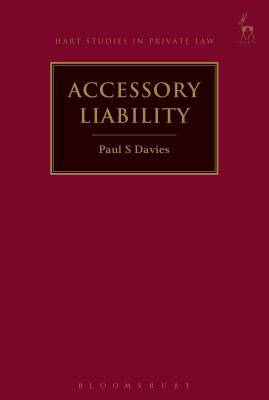
Bedankt voor het vertrouwen het afgelopen jaar! Om jou te bedanken bieden we GRATIS verzending (in België) aan op alles gedurende de hele maand januari.
- Afhalen na 1 uur in een winkel met voorraad
- In januari gratis thuislevering in België
- Ruim aanbod met 7 miljoen producten
Bedankt voor het vertrouwen het afgelopen jaar! Om jou te bedanken bieden we GRATIS verzending (in België) aan op alles gedurende de hele maand januari.
- Afhalen na 1 uur in een winkel met voorraad
- In januari gratis thuislevering in België
- Ruim aanbod met 7 miljoen producten
Zoeken
€ 88,45
+ 176 punten
Uitvoering
Omschrijving
Accessory liability in the private law is of great importance. Claimants often bring claims against third parties who participate in wrongs. For example, the 'direct wrongdoer' may be insolvent, so a claimant might prefer a remedy against an accessory in order to obtain satisfactory redress. However, the law in this area has not received the attention it deserves. The criminal law recognises that any person who 'aids, abets, counsels or procures' any offence can be punished as an accessory, but the private law is more fragmented. One reason for this is a tendency to compartmentalise the law of obligations into discrete subjects, such as contract, trusts, tort and intellectual property. This book suggests that by looking across such boundaries in the private law, the nature and principles of accessory liability can be better understood and doctrinal confusion regarding the elements of liability, defences and remedies resolved.
Winner of the Joint Second SLS Peter Birks Prize for Outstanding Legal Scholarship 2015.
Winner of the Joint Second SLS Peter Birks Prize for Outstanding Legal Scholarship 2015.
Specificaties
Betrokkenen
- Auteur(s):
- Uitgeverij:
Inhoud
- Aantal bladzijden:
- 328
- Taal:
- Engels
- Reeks:
- Reeksnummer:
- nr. 13
Eigenschappen
- Productcode (EAN):
- 9781509914104
- Verschijningsdatum:
- 25/05/2017
- Uitvoering:
- Paperback
- Formaat:
- Trade paperback (VS)
- Afmetingen:
- 155 mm x 231 mm
- Gewicht:
- 566 g

Alleen bij Standaard Boekhandel
+ 176 punten op je klantenkaart van Standaard Boekhandel
Beoordelingen
We publiceren alleen reviews die voldoen aan de voorwaarden voor reviews. Bekijk onze voorwaarden voor reviews.









